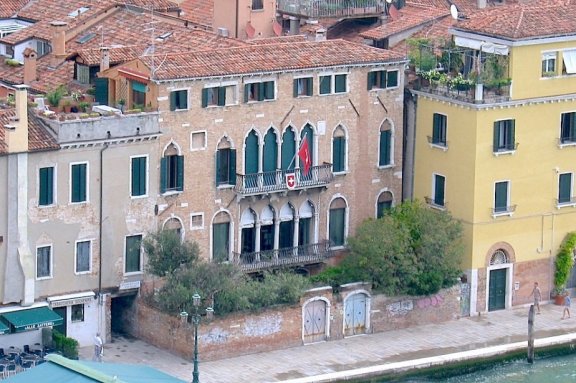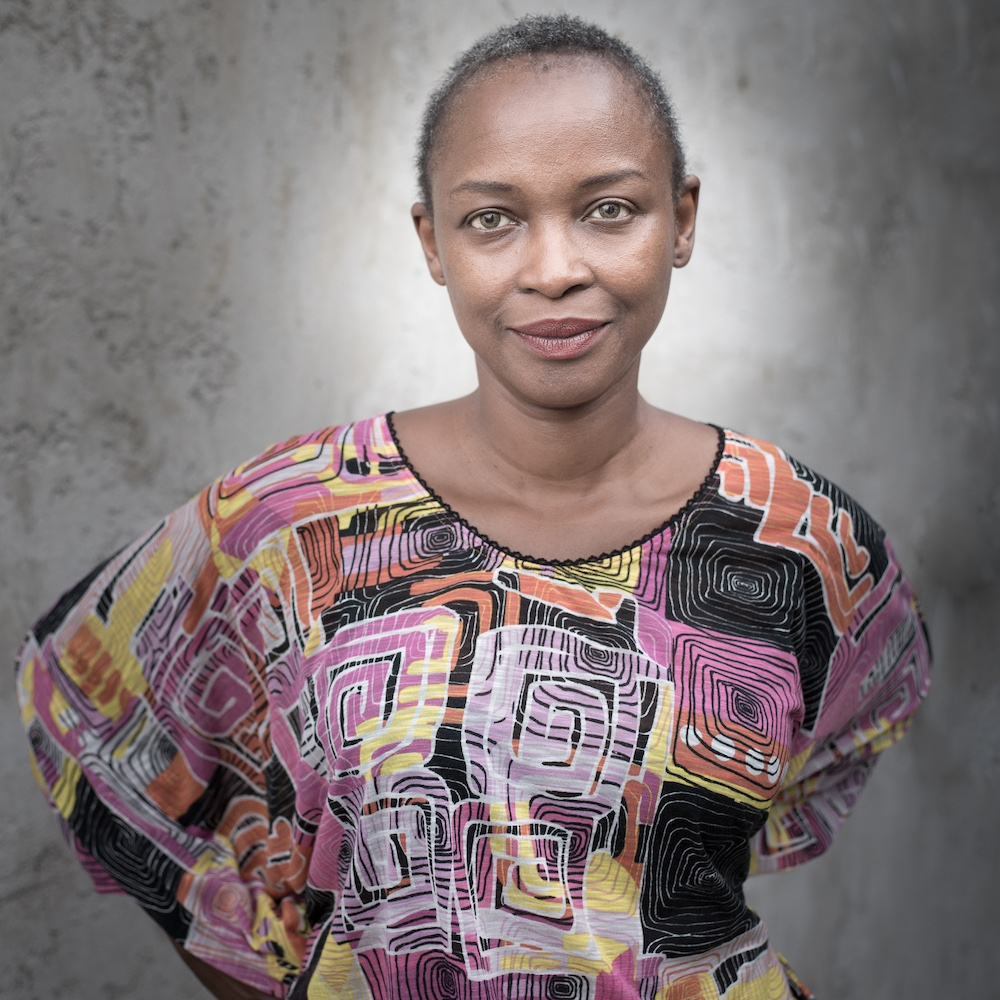As a collateral event to the 57th Venice Biennale, Salon Suisse is a series of talks and events at the Palazzo Trevisan degli Ulivi in Venice, organised by Pro Helvetia in collaboration with Dakar-based RAW Material Company. Titled ATARAXIA, the series looks at the paradoxical position Switzerland occupies within the current economic, political, scientific and cultural landscape of Europe and further afield. Ahead of ‘Eating well’, ArtReview spoke to Koyo Kouoh, RAW Material Company’s artistic director and founder, about the ideas behind the Salon, national identity, and cooking…
AR ‘Ataraxia’ is Greek word, that more or less means ‘a state of serene calmness’. Why title the Salon Suisse season of events in this way?
KK As a collateral event to the art and architecture biennials in Venice, Salon Suisse is intended to be a space for discussion, reflection and enjoyment of ideas and issues about Switzerland as a producer of culture and ideas. Given that, the opportunity to take a critical look at the idea of Switzerland as a serene, silent force of European economy, arts and science was one I couldn’t ignore! How is it that such a small place, 250km from north to south and 360km from west to east, managed to carve itself such a face of innocence, neutrality, hospitality and absolute sovereignty amid the political and economic earthquakes that shook Europe during the twentieth century? My interest was in that.
AR The first salon was all about ‘euphony’. The next one, at the end of this month, is titled ‘eating well’. Can you tell us more about these themes?
KK The four themes of the programme are ‘euphony’, ‘eating well’, ‘cultivating well’ and ‘kinesis’. Each salon centres a set of provocations around the social, cultural and political associations of a topic in relation to national identity. ‘Euphony’ primarily explored sound and music as a vehicle for bringing together different cultural and social histories – in the way that a music festival can bring together musicians of diverse backgrounds, but also as a more experimental or lo-fi practice. The latter was explored by Pádraic E. Moore in a vinyl set called Music for Chameleons – a project mining the transgressive undertones of club and music cultures, while looking at their relevance today. The upcoming theme, ‘Eating well’, takes culinary activity and history as a way of dissecting (and tasting) identity through regional dishes and foraging in built-up environments – a practice that is shaped by environmental factors, as well as being revealing about access or a lack of access to land and agriculture.

AR In the programme’s notes you mention that you take you inspiration from Roland Barthes’s 1957 collection of essays Mythologies, and his use of the term ‘mythologisation’. Could you expand on this?
KK I understand mythologisation in the territorial context we’re discussing here as the transformation of a particular trait, character or event into a sacrosanct virtue. A kind of firewall against criticism and inquiry. A process of silencing to an extent that it becomes a core belief, such as ‘Switzerland is prosperous because its citizens are hardworking’. Whereas we all know that you can’t achieve this level of wealth and prosperity without the help of good-old exploitation! That is the danger of myths.
AR Switzerland is in the centre of Europe, but not part of European Union (in a way that might soon have parallels with our situation in the UK) – did this feed into your thinking?
KK The UK and Switzerland have very different histories in the framework of Europe, even though one could argue that federalism has played an important role in their respective process of nation building. But then again this can be said of most countries in Europe and elsewhere for the matter. However, my political curiosity compels me to wonder how far the concept of an independent nation can go when what’s necessitated by the multiple socio-ethical and political crises we’re facing in our current era is an injection of empathy, openness and understanding, and that means relating to and communicating with others around us, even where difficult.
AR Does national identity matter anymore?
KK This is a tricky question. The fact that, worldwide, a select milieu has the privilege of transcending time, spaces and culture, and wistfully consider themselves part of this misleading creation that is the ‘global village’ should not blind us to the fact that more than half of the world population is still rural and lacks access to basic commodities. The European Union is a perfect example of how much national identity still matters: there is not a single member state ready to subordinate their national prerogatives for the benefit of a true federation, as is the case in the US or Switzerland for the matter.
AR How does the history of European empire-building feed into your thinking for this programme?
KK The history of European empire-building is an important aspect of my curatorial practice because the effects of this enterprise have not only radically changed the course of human development but also continue to shape our contemporary lives. It goes without saying that the movement of people and the wars that we witness today are to a large extent consequences of European empire building of the eighteenth and nineteenth centuries. They are part and parcel of a long-term decolonisation process.
AR How can participatory activities around the rituals of food tell us about community?
KK First of all, I consider cuisine and cooking as (still) underrecognised art practices. When Roger Buergel invited chef Ferran Adrià to be part of his Documenta 12 ten years ago, it was a sensation. Nowadays, cuisine and artists who cook are everywhere. Participatory activities have this advantage that they offer the viewer the possibility to step in, to be active within the work, to physically do and experience something, sometimes even to take charge. That is very attractive to most audiences. It provides a great sense of contribution, of sharing. It has the potential of great satisfaction. Cuisine, cooking and food do just that.
AR How important is the notion of community right now?
KK There this African proverb that says if you want to go fast, go alone. But if you want to go far, go together. And I’ll top that with my grandmother’s wisdom: People are like the five fingers of your hand. Some are stronger, thicker, taller, but they are ultimately equal and interdependent. Lose one and you’d know. People (and countries) will always build communities and alliances. That is the raison d’être of the social species that we are. It is at the core of our existence. To reply to the now, I have to invoke Frantz Fanon who said that each generation must discover its mission, fulfil it or betray it. This quote could be read as an analogy of the importance of community.
AR Do you think there is some significance in holding this series of talks in Venice, given that it has historically been a meeting point for different cultures?
KK Contemporary Venice is more of a flocking point than a meeting point, I would say. Be it the gawking four-hours-tourist or the rushing art professional who come here for an ever-so-brief visit I doubt that there is time for any of them to have real meetings. However, where Venice as a location brings significance to the programme is the fact that – over centuries – the city has accomplished a phenomenal process of mythologisation itself. So it offers the perfect backdrop for the Salon.
AR What do you hope will be the response to ATARAXIA?
KK That the audience enjoys the opportunity of the moment reflection. If that reflection carries on and contributes to the deconstruction of myths surrounding them, then we’ve achieved a lot.
‘Eating well’ will feature contributions by Sandra Knecht, Maurice Maggi, Reza Afisina, Zoe Butt, farid rakun and David Teh. The full programme for Salon Suisse: ATARAXIA is available here
